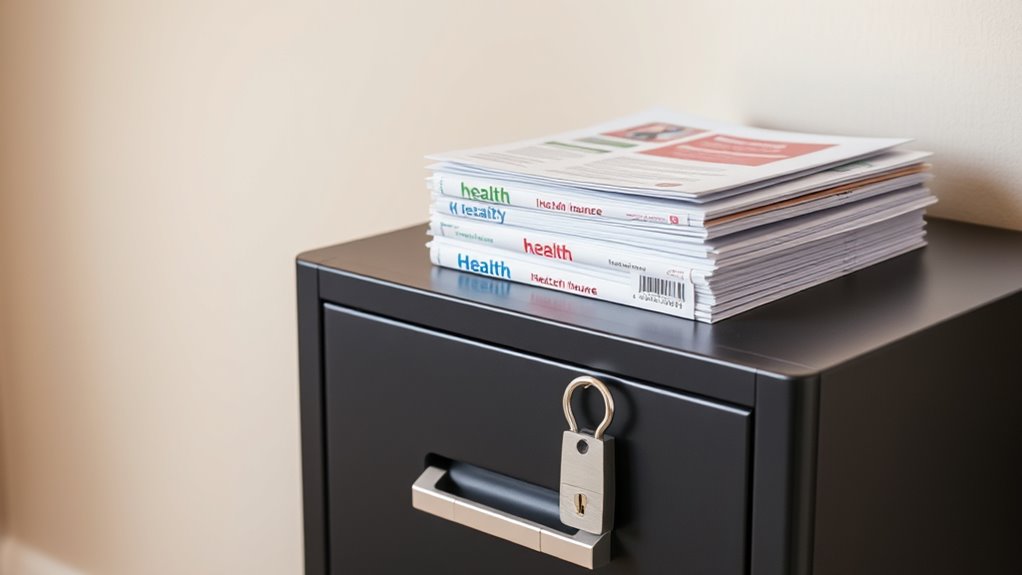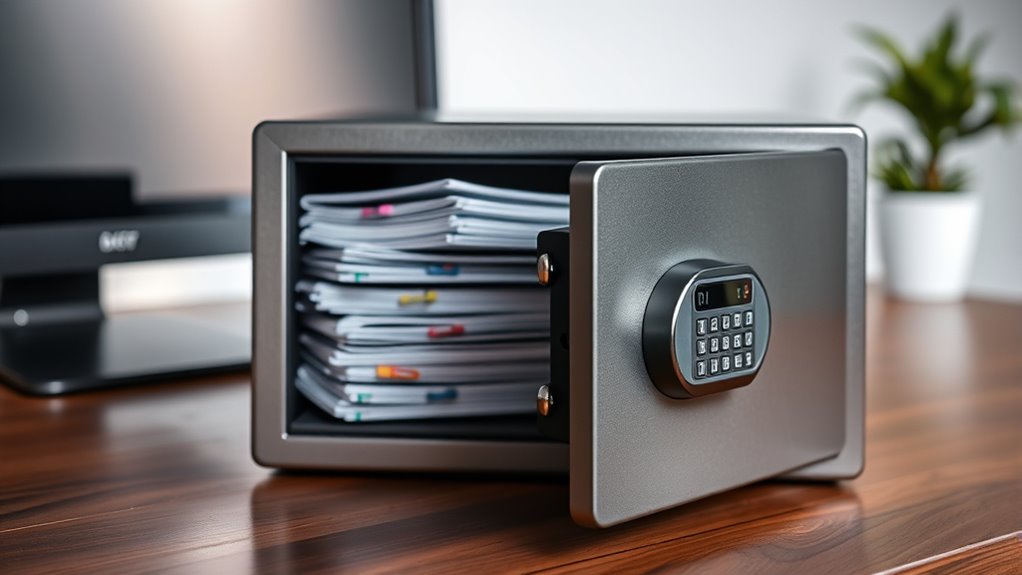To store your health insurance documents securely, use both digital and physical methods. Keep digital copies in encrypted folders or password-protected cloud storage, and make certain you use strong passwords and encryption tools to protect sensitive information. For physical copies, store them in a safe, organized location like a lockbox or fireproof safe. Regularly update and review your documents, and you’ll find helpful tips on maintaining excellent security for your essential health records.
Key Takeaways
- Use encrypted digital storage solutions such as password-protected folders or cloud services with strong encryption.
- Store physical documents in a secure, fireproof, and waterproof safe or lockbox at home.
- Protect digital files with strong, unique passwords and enable two-factor authentication where possible.
- Keep both digital and physical copies organized and regularly updated for accuracy and security.
- Avoid unsecured storage options like unencrypted devices, unlocked drawers, or shared folders.

Have you ever struggled to find your health insurance card or policy details when you need them most? It’s frustrating, especially during emergencies or when visiting a new healthcare provider. The key to avoiding this hassle is storing your documents securely and accessibly. You have two main options: digital encryption and physical storage. Each offers advantages, but combining them can give you peace of mind that your sensitive information stays safe and easy to retrieve.
Starting with digital storage, the main benefit is convenience. You can keep scanned copies of your insurance cards, policies, and claims on your devices, whether it’s your computer, tablet, or smartphone. But it’s essential to guarantee these digital files are protected against unauthorized access. This is where digital encryption comes in. By encrypting your files, you scramble the data so that only you, or someone with the proper decryption key, can access the information. Encryption acts as a barrier, making it nearly impossible for hackers or unauthorized individuals to read your sensitive health information if your device gets lost or stolen. Use reputable encryption tools and keep your passwords strong and unique to bolster your digital security.
Encrypt your health documents for secure, easy access on your devices.
Physical storage also plays an important role. Printed copies of your insurance cards, policy documents, and claims can be stored in a secure location at home—like a safe or lockbox. Choose a spot that’s both protected from potential damage (like fire or water) and not easily accessible to others. Having these documents physically on hand can be invaluable in situations where digital access isn’t possible, such as at a remote clinic or during a power outage. Additionally, keeping a small, organized binder or envelope with your essential insurance documents ensures you can quickly grab what you need without sifting through clutter. Recognizing that dog breeds can vary in size and temperament, tailoring your storage solutions to your specific needs can make access even easier.
To maximize security, consider maintaining both digital and physical copies. Store digital versions securely, using encrypted folders or password-protected cloud storage. Keep physical copies in a safe, designated spot, and regularly update both sets to reflect any changes or renewals. Remember, never leave your insurance information in unsecured places like unlocked drawers or unencrypted devices. By combining the protection of digital encryption with the reliability of physical storage, you create a complete system that safeguards your health information while guaranteeing you can access it whenever necessary. When you know your documents are both secure and readily available, you’ll face fewer worries during critical moments, making your healthcare experience much smoother.
Frequently Asked Questions
How Long Should I Keep My Health Insurance Documents?
You should keep your health insurance documents for at least a few years after your coverage ends, in case of future claims or questions. Make sure to prevent document duplication by storing originals in a safe, accessible location, like a secure file cabinet or digital backup. Regularly review and update your storage location to ensure your records remain protected and easy to find when needed.
Can I Store Digital Copies Securely?
Digital dilemmas demand diligent decisions. Yes, you can store digital copies securely by prioritizing digital security and choosing trusted cloud storage. Guarantee your files are protected with strong passwords, two-factor authentication, and encryption. Regularly update your security settings, and back up your data to prevent loss. By practicing prudent precautions, you’ll keep your health insurance documents safe, accessible, and always at your fingertips whenever you need them.
What Should I Do if My Documents Are Lost?
If your health insurance documents are lost, act quickly to prevent document theft. Contact your insurance provider immediately to report the loss and get replacement copies. Keep emergency access details handy, like account numbers and contact info, so you can verify your identity easily. Consider storing digital copies securely online to prevent future issues. Always monitor your accounts for suspicious activity, and update your records promptly if needed.
Are There Legal Requirements for Storing Health Insurance Info?
You need to understand that legal compliance and privacy regulations govern how you store health insurance info. These laws, like HIPAA, require you to safeguard your documents from unauthorized access and ensure confidentiality. You should keep records secure, use strong passwords, and limit access to authorized individuals. Failing to follow these rules can lead to legal penalties, so always adhere to privacy regulations when managing your health insurance information.
How Can I Organize Multiple Insurance Policies Effectively?
You might think organizing multiple insurance policies is overwhelming, but digital filing makes it manageable. Start by creating a dedicated folder for insurance organization, then scan or save all your documents securely. Use clear labels for each policy and update them regularly. This way, you can quickly find what you need in emergencies, avoid misplaced papers, and keep everything organized without clutter, ensuring your health insurance info stays accessible and secure.
Conclusion
So, make sure you store your health insurance documents securely, like locking them in a digital vault or a fireproof safe—think of it as your personal DeLorean, protecting your essential info from any mishaps. Keep everything organized and accessible, so you’re not left in the lurch when you need it most. Remember, a little effort now can save you from a lot of headaches later—like finding your documents in the past, instead of the present.









